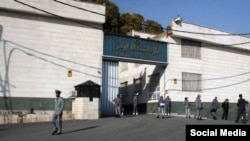Iranian dissidents say the government’s refusal to temporarily release detained activists exposed to the coronavirus in crowded jails has anguished relatives seeking to visit those prisoners.
Two male dissidents who previously were jailed for criticizing Iran’s Islamist rulers and whose activist wives remain behind bars at Tehran’s Evin prison shared their concerns about the plight of prisoners’ families in comments to VOA and posted on social media in recent days.
Speaking to VOA Persian in a Wednesday phone interview, Iranian blogger Behfar Lalehzari said prisoners’ relatives have been facing “tremendous” hardships.
Iran, with the region’s deadliest coronavirus outbreak, has seen the virus spread through its crowded and unsanitary prison compounds since early March, according to activists.
Tehran has not released data on the number of prison infections in the country. It announced the temporary release of up to 100,000 inmates last month, in part to protect them from the virus. But authorities refused to extend the furloughs to dissidents with more than five-year prison sentences for engaging in activities designated as security offenses.
“On one hand, relatives are worried about the well-being of the prisoners, and on the other hand, they know that any visit to those prisoners carries a huge amount of health risk,” Lalehzari said. “Some family members drive long hours to get to a prison, and usually there is a crowd of visitors at the entrance or in the visiting rooms. This means the risk of virus contagion is high in prisons — even for the visitors.”
Lalehzari was released in February 2019 after serving a prison sentence for insulting Iranian Supreme Leader Ayatollah Ali Khamenei and insulting Islamic sacraments. His wife, Rezvaneh Ahmad Khanbeigi, was detained in January 2019 for writing slogans on walls and later sentenced in February 2020 to six years in prison for subversion.
Women’s rights activist Reza Khandan has been campaigning for the release of his wife, human rights lawyer Nasrin Sotoudeh, since her detention in June 2018. Authorities have sentenced Sotoudeh to more than 30 years in prison, according to Khandan, for security offenses related to her legal work in defending Iranian women arrested for removing their compulsory hijabs or headscarves in acts of public protest against Iran’s Islamist rulers.
On his Facebook profile, Khandan posted a photo Sunday showing himself, his son Nima and two unidentified women standing outside Evin prison that day, following a visit with Sotoudeh. Khandan and his son were wearing face masks.
In a message accompanying the photo, Khandan said many families of detainees were taking a great risk of contracting the coronavirus by going back and forth between a prison’s visiting room and the prosecutor’s office. “But families cannot leave (those places) without seeing their loved ones,” Khandan wrote.
Khandan was detained in September 2018 and charged with subversion for his public campaigning for the release of his wife, who had been arrested three months earlier. He was released in December 2018 and sentenced the following month to six years in prison but has remained free pending an appeal.
In his VOA interview, Lalehzari said coronavirus outbreaks in prisons also have reduced prisoners’ access to food and medicine. “They either have no access to health products, or the access is minuscule,” he said.
Iran’s Human Rights Activist News Agency (HRANA) reported in February that Lalehzari’s wife, Ahmad Khanbeigi, has been suffering from epilepsy while in custody at Evin prison and lacked needed medications for her condition. VOA could not independently verify that account of Ahmad Khanbeigi’s health status.
Last week, London-based rights group Amnesty International said it received credible reports that Iranian security forces had cracked down on prisoners protesting in anger at not being furloughed at three prisons since late March. It said the security personnel used live ammunition, tear gas and beatings to kill several dozen prisoners and wound hundreds more. Iran had no immediate comment on the report.
This article originated in VOA’s Persian Service.




